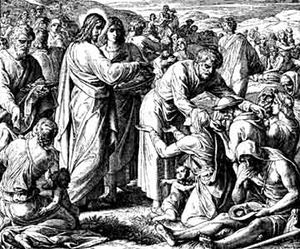|
|
| Line 1: |
Line 1: |
| [[File:Jesusfeeds.jpg|right|300px|thumb|[[Abraham]], [[Moses]], John the [[Baptism|Baptist]] and [[Jesus]] and the [[early Church]] advocated a [[Daily ministration]] for the needy of the Christian community that was dependent on [[Charity]] only and it was not like the system of [[Corban]] of the [[Pharisees]] nor the [[Bread and circuses|free bread]] of [[Rome]]. It was their [[Pure Religion]] that brought them into a [[Christian conflict]] with [[Public religion]] and the [[Covetous Practices]] of the [[World]].]] | | [[File:Jesusfeeds.jpg|right|300px|thumb|[[Abraham]], [[Moses]], John the [[Baptism|Baptist]] and [[Jesus]] and the [[early Church]] advocated a [[Daily ministration]] for the needy of the Christian community that was dependent on [[Charity]] only and it was not like the system of [[Corban]] of the [[Pharisees]] nor the [[Bread and circuses|free bread]] of [[Rome]]. It was their [[Pure Religion]] that brought them into a [[Christian conflict]] with [[Public religion]] and the [[Covetous Practices]] of the [[World]].]] |
|
| |
| == Clergy defined ==
| |
|
| |
| : CLERGY. "the body of all people ordained for religious duties, especially in the Christian Church." All who are attached to the ecclesiastical ministry are called the [[clergy]]; a clergyman is therefore an ecclesiastical minister.
| |
| : 2. Clergymen were exempted by the emperor Constantine from all civil burdens. Baronius ad ann. 319, 30. Lord
| |
| : Coke says, 2 Inst. 3, ecclesiastical persons have more and greater liberties than other of the king's subjects, wherein to set down all, would take up a whole volume of itself.
| |
| : 3. In the United States the clergy is not established by law, but each congregation or church may choose its own clergyman. [http://www.republicsg.info/dictionaries/1856_bouvier_6.pdf Bouvier's Law Dictionary Revised Sixth Edition, 1856]
| |
|
| |
| To understand who or what is clergy you would have to understand who the "body" is, the requirements to be counted as "ordained", and what would a list consist of to include as "religious duties". If you are going to limit those characteristics to the "Christian Church" as legally defined you would have to look to Jesus Christ for what qualifies as His "ecclesiastical minister" and not to [[Constantine]] and his "exempted" ministers.
| |
|
| |
| The "ecclesiastical ministers" are those [[called out]] by Christ to be in the [[world]] but not of the [[world]].
| |
|
| |
| : CHRISTIANITY. The [[religion]] established by Jesus Christ.
| |
| : 2. Christianity has been judicially declared to be a part of the common law of Pennsylvania; 11 Serg. & Rawle, 394; 5 Binn. R.555; of New York, 8 Johns. R. 291; of Connecticut, 2 Swift's System, 321; of Massachusetts, Dane's Ab. vol. 7, c. 219, a. 2, 19. To write or speak contemptuously and maliciously against it, is an indictable offence. Vide Cooper on the Law of Libel, 59 and 114, et seq.; and generally, 1 Russ. on Cr. 217; 1 Hawk, c. 5; 1 Vent. 293; 3 Keb. 607; 1 Barn. & Cress. 26. S. C. 8 Eng. Com. Law R. 14; Barnard. 162; Fitzgib. 66; Roscoe, Cr. Ev. 524; 2 Str. 834; 3 Barn. & Ald. 161; S. C. 5 Eng. Com. Law R. 249 Jeff. Rep. Appx. See 1 Cro. Jac. 421 Vent. 293; 3 Keb. 607; Cooke on Def. 74; 2 How. S. C. 11-ep. 127, 197 to 201.
| |
|
| |
| {{Clergyism }}
| |
|
| |
| == Clergy of Christ ==
| |
|
| |
| If the clergy is "the body of all people ordained for religious duties" then Christ's clergy would be the body of ministers [[ordain]]ed by [[Jesus]]. That would be first the Apostles and their successors or at least those who are fulfilling the "duties of religion". So we need to know what was [[religion]] and what '''[[Pure Religion]]''' would be and the instructions to the apostles given by Jesus to know what those duties were.
| |
|
| |
| Jesus clearly [[called out]] His [[little flock]] to serve the people without ''[[exercise authority|exercising authority]] one over the other.'' They were to be separate from the [[world]] with [[vow of poverty|no personal estate]] owning [[all things common]] like the [[Levites]] before them. The oversaw a [[daily ministration]] that served the needs of their [[society]] rightly ''dividing bread and supplies from house to house'' and across borders of nations during economic [[dearth]]s and famines.
| |
|
| |
| [[Elder]]s of the [[early Church]] were first of the [[laity]] and functioned as free souls according to the [[Perfect law of liberty]]. They could become a part of the [[clergy]] of Christ who like Christ only came to serve, not rule over the people.
| |
|
| |
| Is the '''[[modern Church]]''' doing what the '''[[early Church]]''' did?
| |
|
| |
| Without the [[Church in general]] which we may call the [[laity]] gathering in [[free assemblies]] or [[congregations]] of [[Tens]] and the ''Church specific'' which consists of the offices of [[Deacon]], [[Bishop]] and [[Priest]], There will be the temptations of [[Balaam]] and the [[Nicolaitan]].
| |
|
| |
| == Clergy of the world ==
| |
|
| |
| Who is the ''Clergy of the [[world]]''? Are those who provide the services in modern government which was once the exclusive province of the Christian community in fact the "clergy of the State " providing the administration of [[welfare]] to the needy? That would be what is sometimes called "'''[[public religion]]'''" which is often doing what the [[early Church]] used to do. They are the administrators of your social [[welfare]] by the governments of the [[world]].
| |
